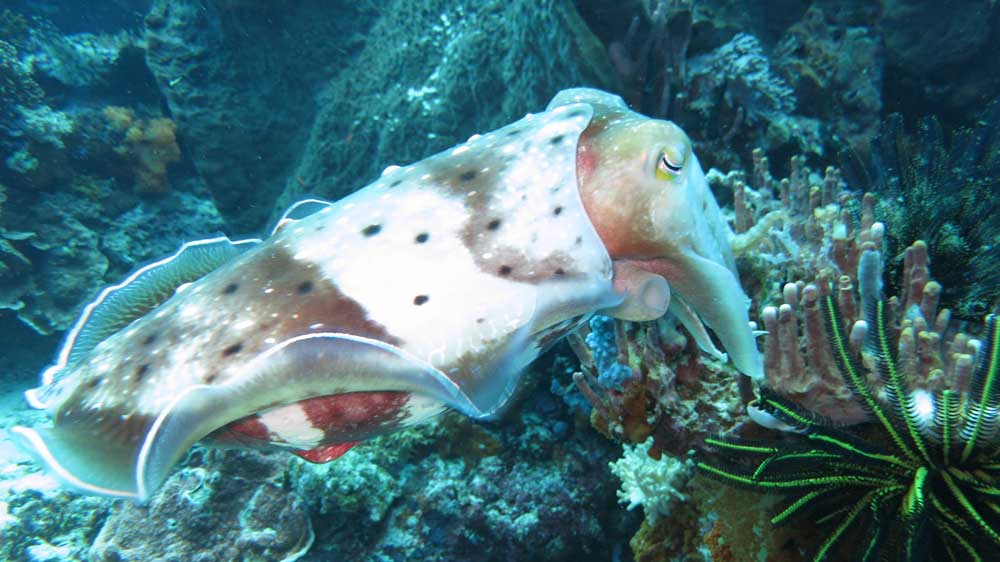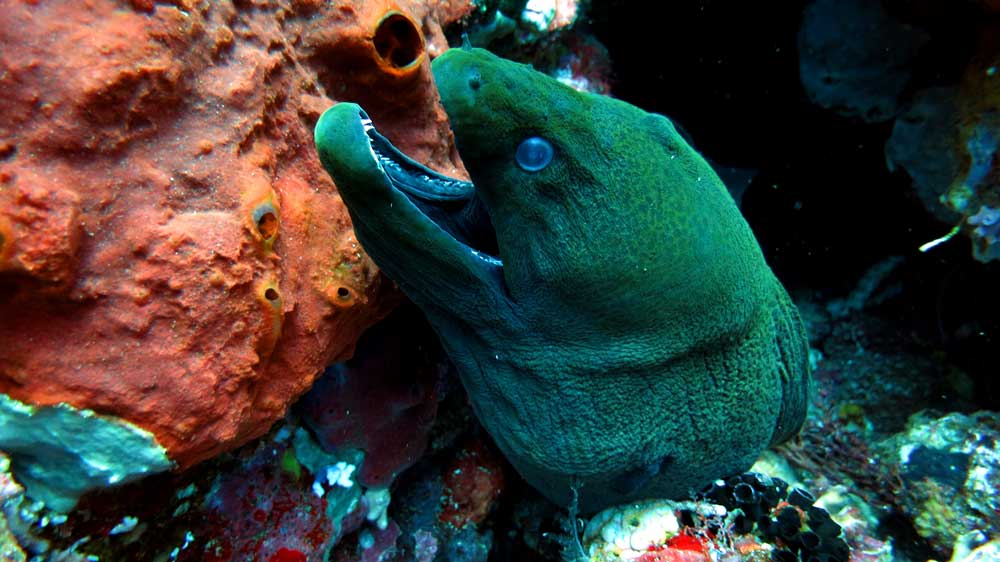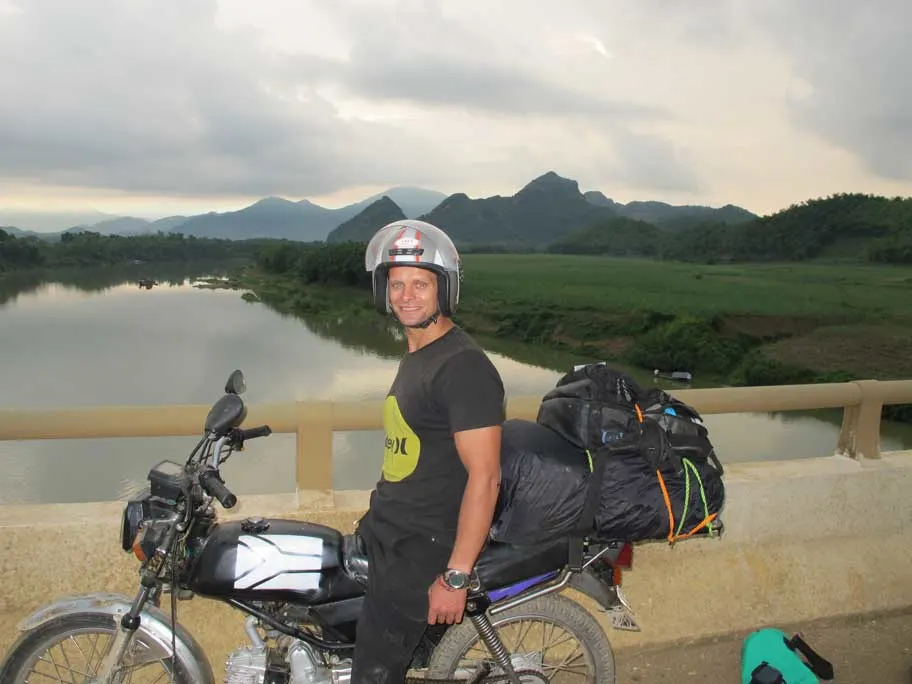In this guide to diving in Komodo National Park, we discuss the best dive sites, dive operators, liveaboard diving, marine life, and diving options from Flores Island. In this magical part of the Coral Triangle, you can expect to see the most wonderful organisms, from massive manta rays, dugongs, giant trevallies, sunfish (mola mola), white tip reef sharks to amazing tiny critters like the poisonous blue-ringed octopus, the pygmy seahorse, frogfish and spectacular hard corals. The park is accessed by most from Labuan Bajo on Flores Island. Reaching Labuan Bajo from Bali is easy, check out our Complete Bali Diving Guide for everything you need to know about diving from this popular island.
For more about traveling and exploring the island see our Komodo Island and Flores complete guide

Komodo National Park
Komodo National Park includes three large islands; Komodo, Rinca, and Padar, and also includes many little islands to cover a total area of about 1,800 km2. In 1991 the Komodo National Park was declared a UNESCO World Heritage Site. The Park is home to more than 4,000 dragons and is located in the Coral Triangle which contains some of the richest marine biodiversity on Earth, prepare yourself for unreal diving. Located in the Indian Ocean the park is one of the New 7 Wonders of Nature.
Highlights of Scuba Diving Komodo Island
Indonesia is probably the best country in the world for diving around Komodo island is one of the dive highlights in this underwater paradise. The amount and variety of fish are unreal, millions of reef fish of all shapes, colors, and sizes, and plenty of massive pelagic fish and sharks hunting in crystal clear water on the pristine coral reefs. The highlights for most that visit the park are the massive manta rays gliding around underwater and the Komodo Dragons walking on the Komodo and Rinca islands. Diving here is mainly about the big stuff, but do not underestimate the macro life in the park, we saw some amazing things; a blue-ringed octopus, seahorse, crocodile fish, pygmy seahorse, and more.
We have spent plenty of time exploring different islands around Indonesia, and seeing what we think is All the Best Diving Around Indonesia.
Liveaboard diving or diving from Labuan Bajo?
The Komodo National Park is located within the Lesser Sunda Islands and includes Komodo, Rinca, Padar, and 26 small islands. The sites in the park are fairly spread out, making this a great area to explore by liveaboard. You can dive into most of the sights you will dive by liveaboard on day trips from Labuan Bajo, this option is cheaper.
Why dive into Komodo National Park from a liveaboard?
Liveaboard boats dive sites in Komodo National Park that are far from Labuan Bajo and difficult to reach on day trips.
You will be at the dive sites first, while hundreds of divers are heading to the dive sites on slow boats, you are already in the water before other divers scare your fish away!
(diving is often dictated by current and tides, thus sometimes being there first won’t get you in the water first) still nice to wake up on the dive site and roll into the water after breakfast!
Night dives, everything is different at night and it is amazing to be able to dive these far-off sites at night
It is awesome, what can be better than living on a boat for a couple of days, waking up and diving some of the world’s best sites after breakfast and then all day…
Komodo Liveaboard Diving Boats Worth Booking
There are liveaboards at a huge variety of budgets operating around Komodo, before you book do research and read reviews on the boats. Here are some excellent Liveaboard options for diving in Komodo National Park.


For fantastic deals on liveaboard trips in Komodo National Park in 2023 Check out these boats:
Amaya Explorer – Fantastic deals for 2024!
Blue Manta Liveaboard – A well-rated boat, with exceptional reviews! check 2024 specials.
Aurora Liveaboard, Indonesia – Popular boat, advantages of a modern boat combined with the charm of a traditional one.
Aliikai Voyage – Cruise in comfort and style in the fully refurbished traditional phinisi.
Scubaspa Zen – Luxury liveaboard combines Indonesia’s best diving with Five Star service.
More Komodo Liveaboard Deals for 2024!
Komodo National Park Dive Sites (our dive log)
Batu Bolong (rock with a hole in it)
Max Depth 30m, Avg Depth 14m, viz 25m, temp 27C
Batu Bolong is our best dive site in Komodo National Park. Descending in the crystal clear water next to this rock it feels like you are in an aquarium.
Massive schools of small zebra fish and a variety of colorful fish swim close to the surface. We saw massive greater barracuda, giant trevally, schools of blue spot trevally, tuna, and a variety of pelagics hunting around the rock.


Looking closer to the rock there were hawksbill turtles, moray eels, stone fish, and a variety of nudibranchs. The rock drops down to 70m in at about 30m when looking down there were reef sharks and a variety of big wrasse, including a massive Napoleon swimming around. Nice deeper diving for the experienced diver. This dive spot is one of the best dives to start your day on a liveaboard trip.
The Cauldron
Max Depth 29m, Avg Depth 11.2m, viz 20m, temp 27C
This was a very nice dive to see big fish. Good visibility. We saw the first manta ray of our Komodo dive trip here! The dive site has a sloping reef. We land on a big sand patch followed by a nice drift dive through a channel. Great fish life, we saw several large Giant Trevallies, sweetlips, schools of batfish, large groupers, moray eels, nudibranchs, and big hawksbill turtles.


Manta Point (Makassar Reef)
Max Depth 15m, Avg Depth 10m, viz 20m, temp 27C
Manta Point is the best place to dive with manta rays in Komodo National Park. The site is a cleaning station where Manta Rays come to get their parasites removed. Manta Alley is the other well-known cleaning station in Komodo National Park. Also known as Makassar Reef, Manta Point is one of the most dived sites in the park. The large mantas often school in the area! We also saw some eagle rays majestically flying over the reef, for me the most graceful of all rays. These cleaning stations are drift dives in shallow waters with some rocky outcrops. On a good day, your dive guide will lead you to some great interactions in the crystal-clear waters of this great place.
Best time to dive Manta Point – You can see mantas here all year round, but the best season for mantas is from December to February when you can have 20 or 30 of these giants circling you! It is a very flat, shallow site with small rocks covering the bottom. The current here can be very strong and some groups use reef hooks to remain in one position, hovering in the current while looking at the mantas. In late November we saw many mantas diving at this site, but in August we saw very few.
Manta Bay and Manta Point at Nusa Penida in Bali were two excellent spots for snorkeling with manta rays where we were swimming with loads of large mantas in Indonesia during our last visit to Komodo Island.
Crystal Rock
Max Depth 28m, Avg Depth 17m, viz 20m, temp 28C
Crystal Rock is a great dive site in north Komodo. Large see mound, covered in beautiful soft corals, and hard corals. Many black tip reef sharks. Huge dog tooth tuna. Strong currents are common, and dive conditions are more suited for advanced divers.
The site with the best chance to see huge trevallies, many came very close to us. Big Napoleon wrasse, many sweetlips, batfish, butterfly fish, and blue spot trevallies.

Wae Nilo
Max Depth 19m, Avg Depth 14m, viz 8m, temp 27C
Close to Rinca Island, usually dived as an alternative to the Rinca dragon hike to see the famous Komodo Dragons. This is a classic muck diving site with, a flat sandy bottom and some awesome unique things to discover, the best way to explore this site is with a good guide. We saw a sea horse and my first blue-ring octopus!
Castle Rock
Max Depth 27m, Avg Depth 13.9m, viz 20m, temp 27C
Castle Rock is a large rock coming up to 4m on the surface. One of the most popular Komodo dive sites. The dive starts in open water with a quick descent, there are strong currents. Plenty of white-tip reef sharks, grey reef sharks, giant trevally, and barracudas. Dolphins are often seen here. The dive site is more suitable for seasoned divers.
Tatawa Besar
Max Depth 19m, Avg Depth 11.2m, viz 20m, temp 28C
Awesome drift dive, beautiful hard and soft corals. Amazing reef covered in fish at 10-20m depth, Great dive, Big GTs, huge Napoleon wrasse, snappers, breams, Bluefin trevallies, many damsel fish, sweetlips, white tip sharks, large cuttlefish, blue spotted stingray, leafy scorpion fish. A favorite dive spot for many scuba divers.
Golden Passage
Max Depth 16m, Avg Depth 9m, viz 20m, temp 28C
Golden Passage is a drift dive in the channel Gili Lawa Darat and Komodo Island. Popular with dive boats. Often dived on day dives by dive schools from Flores Island. Nice chilled-out drift dive in the slow current. Beautiful corals. Big turtle, many sweetlips, a white and a green leafy scorpion fish, and blue spotted stingrays. Many small reef fish.


Siyaba Kecil
Max Depth 22m, Avg Depth 13m, viz 20m, temp 28C
Nice reef, slow current. Some of the best things to see here are the nice macro stuff; frogfish, leafy scorpionfish, different amazing nudibranchs, and scorpionfish. Some blue spotted trevallies, blue spotted stingrays, and small reef fish.
Komodo Dragon Tour
Excellent rated Komodo Dragon Tour – Boat trip from Labuan Bajo exploring the islands of the Komodo National Park. Trek on the volcanic islands Komodo Island and Padar Island and see the Komodo Dragons. Your boat will make multiple stops to swim and snorkel including Manta Point and Pink Beach. Includes hotel pickup and drop off.
Best time to dive Komodo Island
Komodo National Park experiences a wet season and a dry season. Reading about diving conditions in Komodo does not make it easier with so much contradicting information, I believe you can dive all year round.
Our personal experience, in late November, was really good we had good diving every day and we were surrounded by plenty of mantas at Manta Point. In August we also had great diving, the weather was good, viz good, I saw a blue ring octopus in the south, but we saw very few mantas, only 2 in a week of diving.
Diving in the Wet Season
The wet season generally runs from December until March, Jan/ Feb there is a lot of rain, not always pleasant.
January to March can have rough surface conditions at the northern dive sites.
The rainy season is Manta Season!! You can see mantas all year, but the peak season to see mantas is December to February when you can have more than 10 mantas circling you
Visibility is best from November to January, in late November we had plenty of mantas and good diving conditions.
Diving in the Dry Season
The April to November period is considered a dry season when the weather is at its best.
May/June & September/October are rated by many as the best diving conditions.
July and August can have rough seas in the south and Rinca.
Komodo Island Diving Conditions
Water temperatures vary between a minimum of around 80.1°F / 26.7°C in the coldest month of July to an average water temperature of 80.1°F / 26.7°C in the warmest month of December.
North Komodo has an average water temperature of 27-28°C (81-82°F), and good visibility in the range of 15-40m (average 25m), Central Komodo has an average water temperature of 27-28°C (81-82°F) in the surrounding waters, visibility is in the range of 7-30m (average 15m), and South Komodo has an average water temperature of 23-24°C (73-74°F ), and visibility is in the range of 7 to 20m (average 12m).
Going on a dive trip? – Dive Trip Packing List+Tips
Dive qualifications needed for diving in Komodo National Park
There are many sites in Komodo National Park with varying experience required. Some sites do have strong currents and down currents do sometimes occur. Experience is essential to dive here. You can dive into some beautiful spots and see incredible things with an open water qualification (18m max). Your dive operator should only take you on dives suited to your experience level. Don’t be shy to discuss issues around this and group size with them before you go on the dive.
Dive Insurance
If you need evacuation or decompression treatment following diving in remote location can be very costly. For simple and flexible travel insurance on your next dive trip check out World Nomads. Get an online quote here.
World Nomads


Dive Centers for Komodo National Park Scuba Diving
There are many dive operators in Labuanbajo, and several well-known franchise operators are also present elsewhere in South East Asia, e.g. Blue Marlin Dive Center and Scuba Junkie.
We had some great diving with local operators Komodo Dive Center and Divers Paradise Komodo at a great price.


Getting to Labuanbajo
Flying
Getting from Lombok to Labuanbajo flying in is the easiest, budget airlines fly from Bali (Denpasar) to Labuan Bajo (Komodo Airport). Flights are also available from Jakarta to Komodo.
Check here for Flight Deals – Bali to Labuan Bajo
By Bus
You can take a bus-ferry combination from Lombok or Gili Trawangan. This is the cheapest way, but is quite a long trip. See our detailed guide on how to get from Bali to Flores
By Boat
Taking a 3-day boat trip is popular, this is a budget adventure with the boat cruising along for 3 days. I loved this trip, but it is quite a hardcore backpacker’s adventure on a low budget. Snorkeling everywhere on the way, seeing mantas and dolphins. Swimming with fluorescence at night. This was a great trip and I made longterm friends on the way.


Accommodation in Labuanbajo
On a budget – La Boheme Bajo
Medium budget – Golo Hilltop Hotel & Restaurant
Treat yourself – Sudamala Resort, Komodo
Non-diving activities around Labuan Bajo and Komodo
Diving was our main reason for traveling here, but there are many other things to do around this beautiful area.
See the Komodo dragons on Komodo and Rinca island
Go for a day trip to the beautiful Padar island and tackle a steep hike to the amazing viewpoints
Go island hopping, spend a day on Kanawa island
Rent a scooter and drive around Flores, there are some amazing waterfalls to see
Visit Sano Nggoang Lake
Hike Kelimutu Volcano
See thousands of bats migrating from Kalong Island
See our Complete guide to visiting Flores and Komodo
South East Asia Diving Resources
The 17 000 islands of Indonesia offer some amazing sites and an unreal variety of fantastic diving. Bali is the most touristy island and Nusa Penida is a great spot to see Manta Rays all year round directly from Bali. See different options for how to get from Bali to Flores
The massive island Sulawesi is a great spot for diving with some of the best muck diving in the world in the Lembeh strait, some great diving in the lesser explored Bira, and a fantastic off-the-beaten-track island adventure in the Togian islands.
For a lesser explored island with good diving, Pulau Weh near Sumatra is a good place to go.
There is great diving all over South East Asia, if you want to do your open water course or advanced check out our article on the Best Dive Schools on Koh Tao, Thailand. The Perhentian Islands in Malaysia is another fantastic spot for dive training, chilling on the beach with some great dive spots.
Swimming with the massive, gentle whale sharks is a bucket list item for many people and the Philippines is one of the best places in the world to go, for our experience see our articles on Swimming with Whale Sharks in The Philippines and a review on swimming with whale sharks in Oslob in the Philippines.
LIKE THIS POST? PIN IT!


Disclosure: Stingy Nomads take part in the Amazon Services LLC Associates Program and other affiliate programs. We earn advertising fees by advertising and linking to these sites. If you click on the link and purchase the item, we will receive an affiliate commission at no extra cost to you. Thank You!
Please follow and like us:


The strong half of Stingy Nomads, a nomadic aquaman that would be happy to spend all his life in the water diving, surfing and spearfishing but often has to compromise with Alya and go hiking instead. Campbell is responsible for all our marine adventures and following them with write-ups. He loves traveling, braai (BBQ in South Africa), red wine and spending the day in a wetsuit.




















